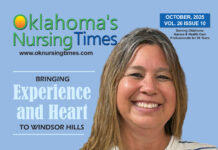St. Anthony Nurse Practitioner Talks Symptoms, Dangers and Treatments of Pneumonia
Coughing, sneezing, runny nose- it’s an epidemic this time of year. Doctor’s offices are full of patients, pharmacy lines are long, winter is definitely not known for being the healthiest time of year.
For this very reason people of all ages struggle through the winter season; however, there are some that struggle more than most. Though some winter illnesses are simply an annoyance, for others they can turn into something a little more alarming.
“Generally the peak time of year for pneumonia is winter time. It tends to affect older adults more because they have weaker immune systems, and other illnesses that lower their ability to fight pneumonia off on their own,” said St. Anthony Family Medicine Nurse Practitioner, Michelle Ellenburg.
Pneumonia is typically initiated by bacteria or viruses, causing inflammation of the lungs, which causes your body to become very tired and worn down. Where just like other illnesses pneumonia is an annoyance to have, it still should be taken very seriously.
The main symptoms of pneumonia are fever, cough which may or may not be productive, shortness of breath, muscle aches, chills, and chest pain,” said Ellenburg. It’s important not to ignore these symptoms as the condition can easily worsen. “The dangers of having pneumonia include developing an aggressive systemic infection, lungs filling with fluid, and a decrease in overall lung function,” she added.
Medications used to treat pneumonia are generally antibiotics and steroids. Recovery depends on the severity of the illness. Some patients can recover in as little as 48 hours, where for some it can take several weeks or longer. So how can we prevent pneumonia?
“Vaccinate! There are two vaccines that protect us from pneumonia. At age 65 all qualify for the Prevnar 13 vaccine, and a year later should follow up with the Pneumonvax vaccine to be fully vaccinated,” recommended Ellenburg. For those under 65, some may qualify early for the vaccine due to pre-existing conditions. “Some patients may qualify for early vaccination if they have for example, Chronic Obstructive Lung Disease (COPD) or diabetes. People should also stop smoking; this can greatly reduce risk.”
If you start exhibiting signs of pneumonia, it’s best to see a physician right away. “Your provider may need to do a chest x-ray and request blood work, so they may determine how to best treat you,” said Ellenburg.
St. Anthony Physicians Group Pulmonary & Family Medicine is open Monday – Friday, 8:30 a.m. – 4:30 p.m., and is located at 6205 N. Santa Fe, Suite 201, in Oklahoma City. To make an appointment with Michelle Ellenburg please call 405-272-8338 or schedule online at saintsnearyou.com/primarycare.












